基于 Cocos 引擎的 Lua 函数效率分析器
基本思路:
Lua 的 lua_hook 功能能在每个函数被调用时和返回时触发一个特定回调,通过计算调用和返
回的时间差即可知道一个函数的耗时
Lua 的 lua_getinfo 函数能取得当前 Lua 的完整调用栈信息
在 ios 和 android 平台可以使用 std::chrono::high_resolution_clock 获得高精度时间,windows
平 台 上 该 接 口 精 度 不 足 , 需 要 更 换 为 QueryPerformanceCounter 和
QueryPerformanceFrequency 两个接口
通过在 hook 函数开头和返回时分别计时来尽量排除计时器本身开销带来的误差
实现功能:
能统计 Lua 虚拟机中每个函数的独占开销占比、总开销占比、调用次数、平均调用时间,最
长调用时间和时间加权的平均调用时间
在调用结束后,生成一个 csv 格式的表格文件,方便进行分析
代码实现:
C++部分代码:
// lua profiler
static inline QWORD profileTimer()
{
#ifdef _MSC_VER
LARGE_INTEGER time;
QueryPerformanceCounter(&time);
return time.QuadPart;
#else
return std::chrono::high_resolution_clock::now().time_since_epoch().count();
#endif
}
static inline QWORD profileTicker()
{
#ifdef _MSC_VER
LARGE_INTEGER time;
QueryPerformanceFrequency(&time);
return time.QuadPart;
�
#else
return
std::chrono::high_resolution_clock::duration(std::chrono::seconds(1)).count();
#endif
}
struct ProfileStack
{
};
std::string name;
QWORD
QWORD
QWORD
startTime;
startOffset;
startCost;
struct ProfileStatistics
{
};
std::string name;
QWORD
QWORD
QWORD
QWORD
selfCost = 0;
totalCost = 0;
maxCost = 0;
callCount = 0;
double
sqrSum = 0;
static std::vector
profileStack;
static QWORD profileOffset = 0;
static QWORD profileCost = 0;
static std::unordered_map profileStatistics;
static void profileHook(lua_State* L, lua_Debug* d)
{
auto p1 = profileTimer();
if (d->event) // return
{
if (profileStack.empty()) return;
auto& ci = profileStack.back();
auto offset = profileOffset - ci.startOffset;
auto cost = p1 - ci.startTime - offset;
auto selfCost = cost - (profileCost - ci.startCost);
profileCost += selfCost;
auto& s = profileStatistics[ci.name];
s.selfCost += selfCost;
s.totalCost += cost;
s.callCount += 1;
s.sqrSum += (double)cost * (double)cost;
�s.maxCost = std::max(s.maxCost, cost);
profileStack.pop_back();
auto p2 = profileTimer();
profileOffset += p2 - p1;
}
else // call
{
profileStack.push_back(ProfileStack());
auto& s = profileStack.back();
s.startCost = profileCost;
{
}
lua_getinfo(L, "Sn", d);
std::ostringstream oss;
oss << d->short_src;
if (d->linedefined > 0)
oss << "(" << d->linedefined << ")";
if (d->name) oss << ":[" << d->namewhat << "]" << d->name;
s.name = oss.str();
auto p2 = profileTimer();
auto offset = p2 - p1;
profileOffset += offset;
s.startTime = p2;
s.startOffset = profileOffset;
}
}
static void dumpProfile()
{
std::vector
list;
for (auto& i : profileStatistics)
{
}
list.push_back(i.second);
list.back().name = i.first;
auto fileUtils = cocos2d::FileUtils::getInstance();
std::ofstream fout(fileUtils->getSuitableFOpen(fileUtils->getWritablePath() +
"profile.csv"));
auto ticker = profileTicker() / 1000.0;
fout << "function name,total cost,self cost,call count,avg cost,max cost,avg^2 cost"
<< std::endl;
for (auto& i : list)
{
fout << i.name << ",";
�fout << i.totalCost * 100.0 / profileCost << "%,";
fout << i.selfCost * 100.0 / profileCost << "%,";
fout << i.callCount << ",";
fout << (double)i.totalCost / i.callCount / ticker << ",";
fout << i.maxCost / ticker << ",";
fout << i.sqrSum / i.totalCost / ticker << std::endl;
}
}
static void beginProfile()
{
}
sealp::callLuaFunction("showNotify", "beginProfile");
profileOffset = 0;
profileCost = 0;
profileStack.clear();
profileStatistics.clear();
auto L = cocos2d::LuaEngine::getInstance()->getLuaStack()->getLuaState();
lua_sethook(L, profileHook, LUA_MASKCALL | LUA_MASKRET, 0);
void SealUtilToLua::beginProfile()
{
}
auto L = cocos2d::LuaEngine::getInstance()->getLuaStack()->getLuaState();
lua_Debug ar;
if (lua_getstack(L, 0, &ar))
{
}
auto scheduler = cocos2d::Director::getInstance()->getScheduler();
scheduler->performFunctionInCocosThread([]() { ::beginProfile(); });
else ::beginProfile();
static void endProfile()
{
}
auto L = cocos2d::LuaEngine::getInstance()->getLuaStack()->getLuaState();
lua_sethook(L, profileHook, 0, 0);
dumpProfile();
sealp::callLuaFunction("showNotify", "endProfile");
void SealUtilToLua::endProfile()
{
auto L = cocos2d::LuaEngine::getInstance()->getLuaStack()->getLuaState();
lua_Debug ar;
�
if (lua_getstack(L, 0, &ar))
{
}
auto scheduler = cocos2d::Director::getInstance()->getScheduler();
scheduler->performFunctionInCocosThread([]() { ::endProfile(); });
else ::endProfile();
}
将 SealUtilToLua::beginProfile()与 SealUtilToLua::beginProfile()两个接口导出到 Lua,在 Lua
中通过控制台指令调用即可
样例报表:
见 profile.csv,配合 excel 的筛选和排序功能能非常方便的定位开销过高的函数,通过数值间
的关联性还能分析出函数是否被重复调用等其他问题
�
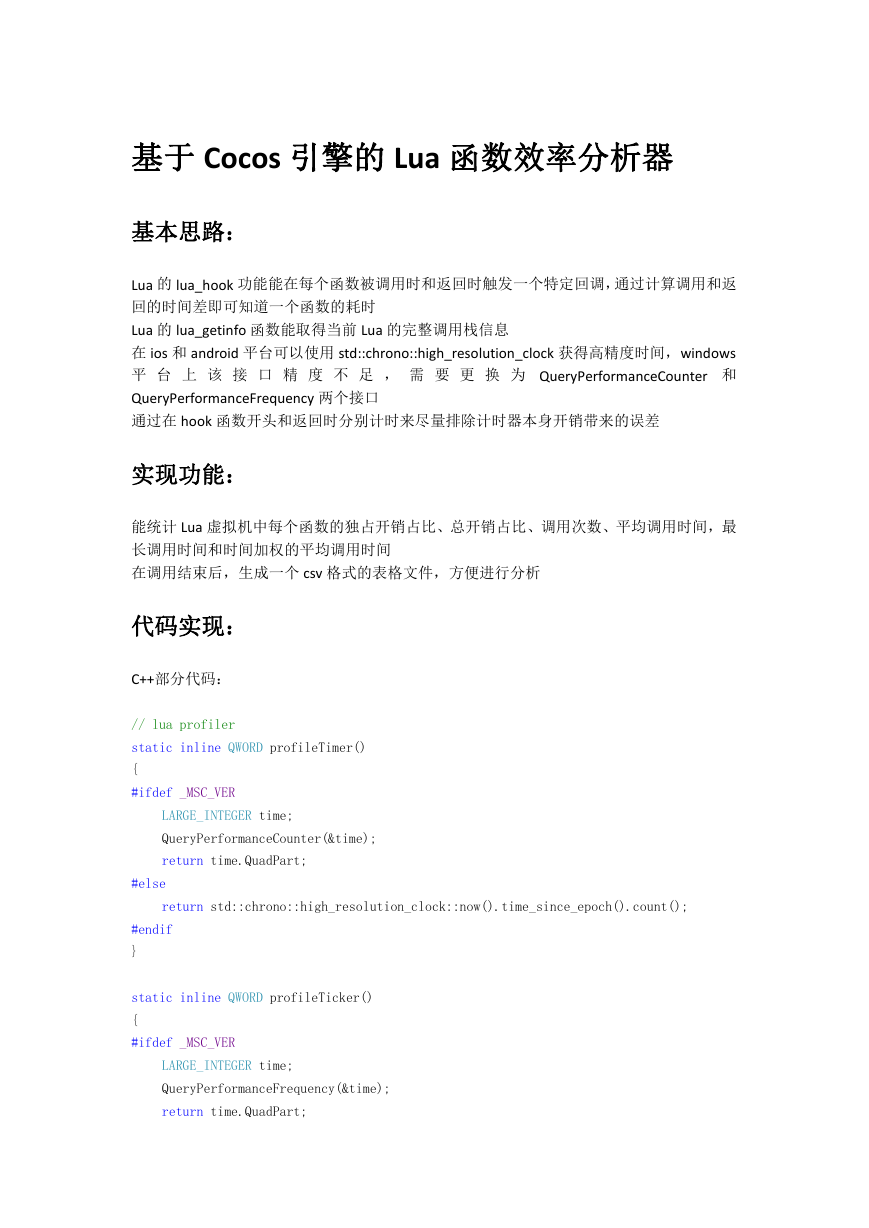
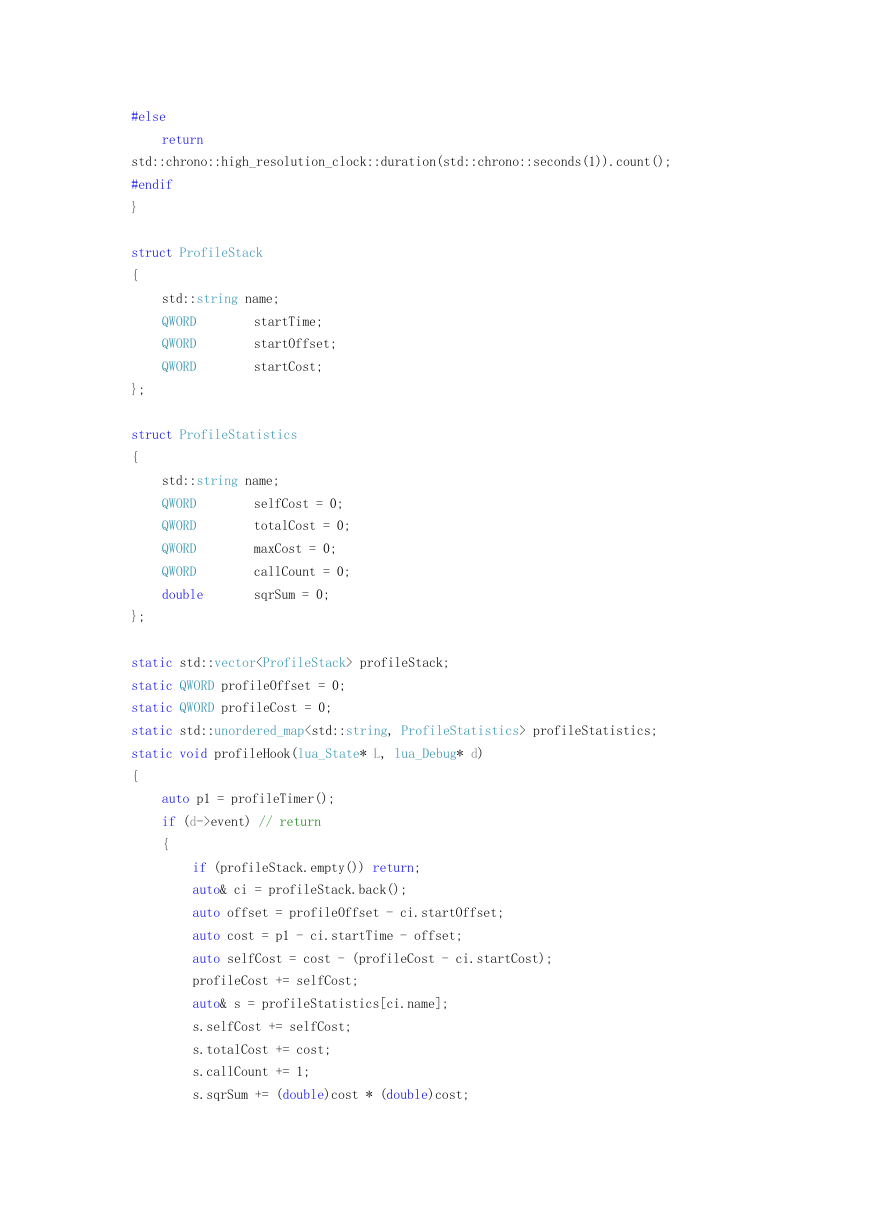
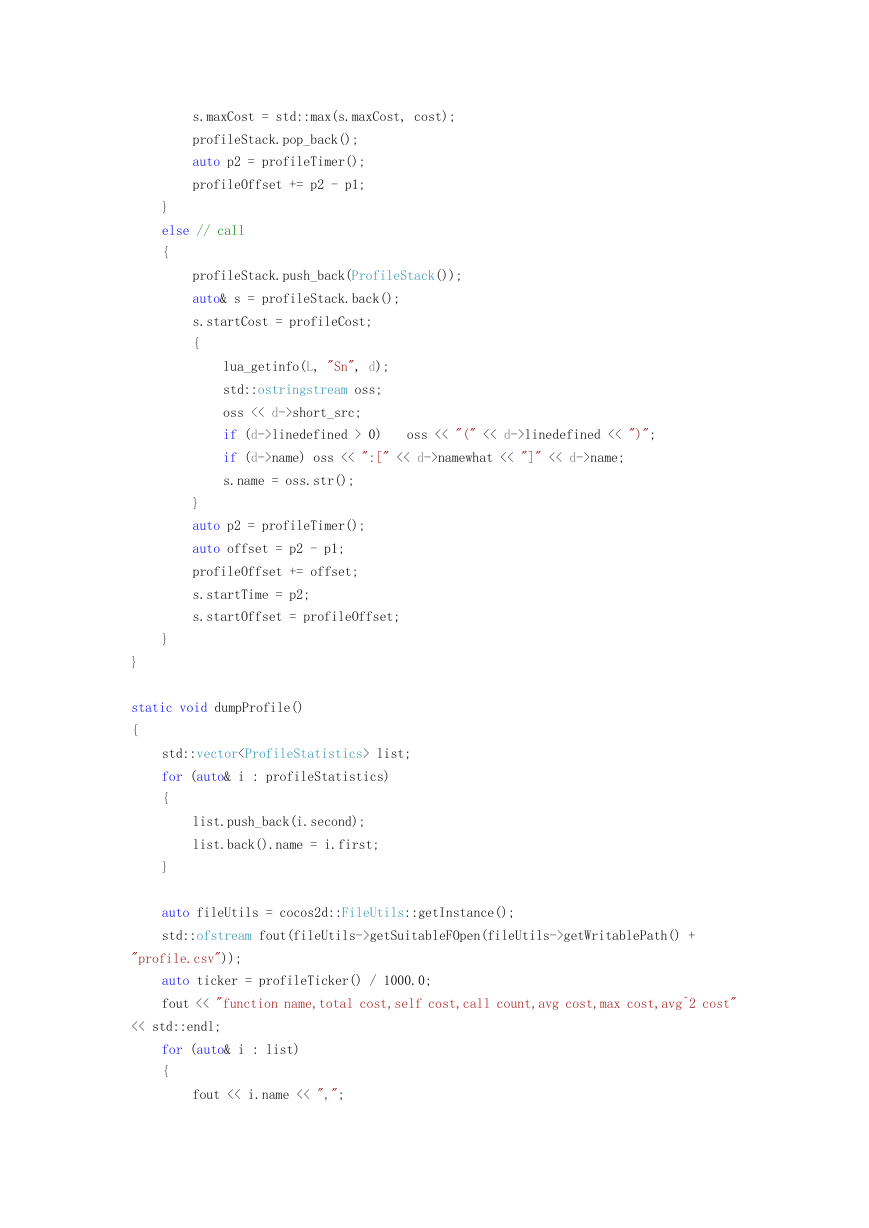
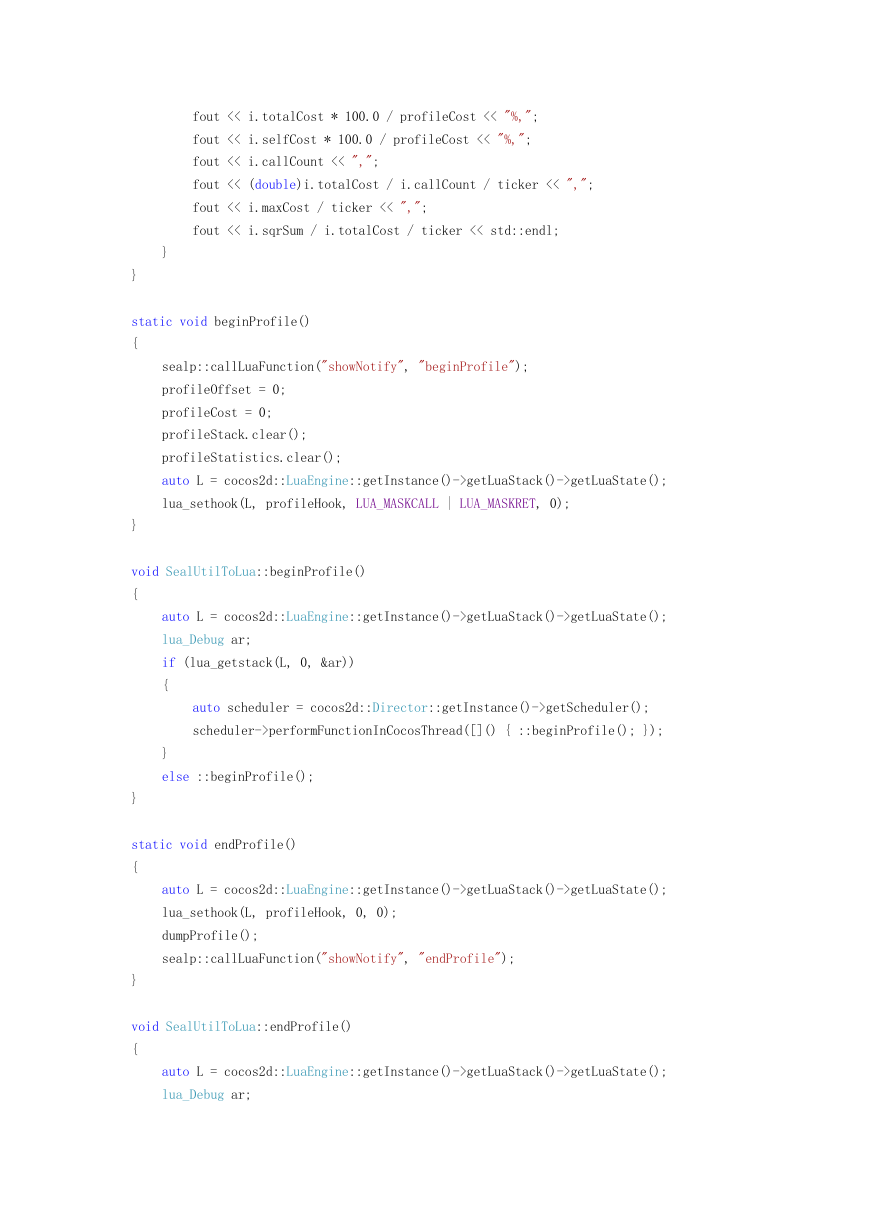
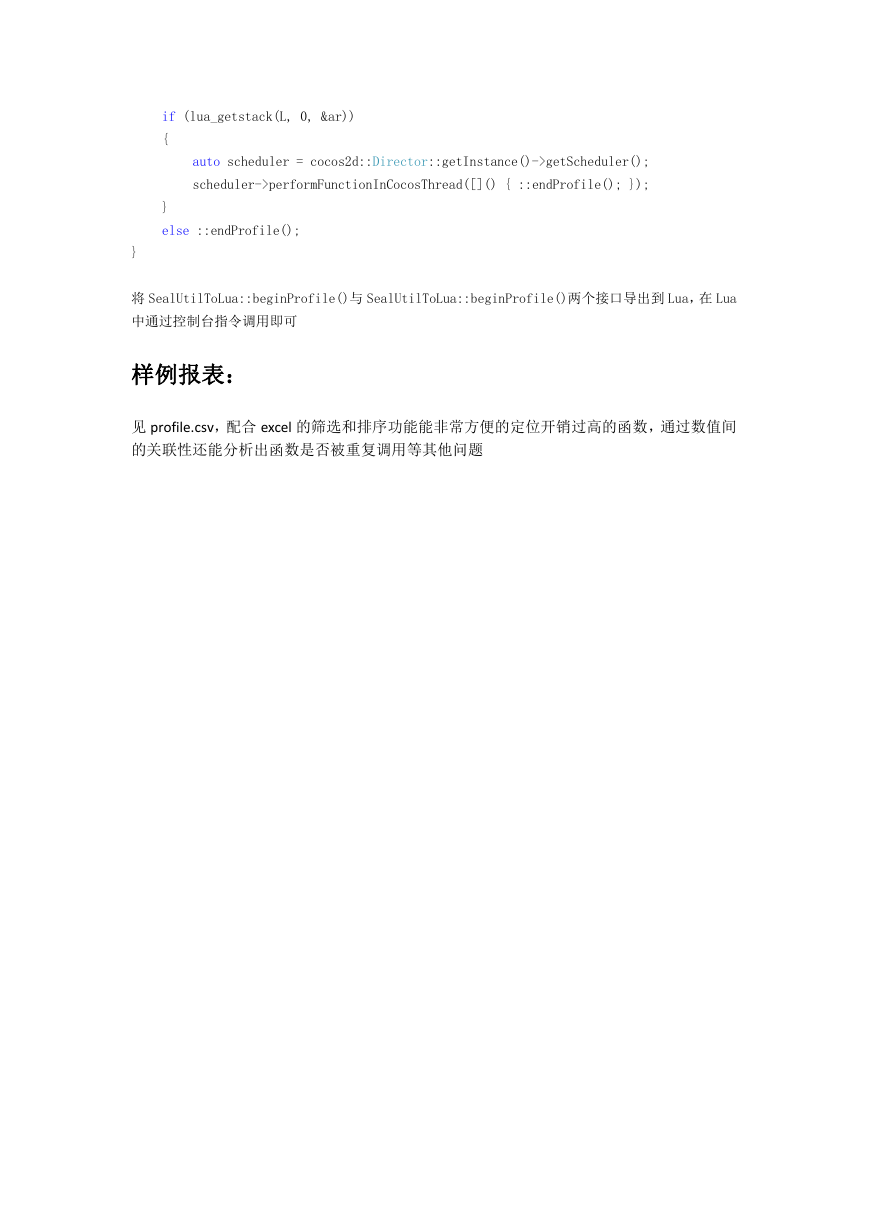





 2023年江西萍乡中考道德与法治真题及答案.doc
2023年江西萍乡中考道德与法治真题及答案.doc 2012年重庆南川中考生物真题及答案.doc
2012年重庆南川中考生物真题及答案.doc 2013年江西师范大学地理学综合及文艺理论基础考研真题.doc
2013年江西师范大学地理学综合及文艺理论基础考研真题.doc 2020年四川甘孜小升初语文真题及答案I卷.doc
2020年四川甘孜小升初语文真题及答案I卷.doc 2020年注册岩土工程师专业基础考试真题及答案.doc
2020年注册岩土工程师专业基础考试真题及答案.doc 2023-2024学年福建省厦门市九年级上学期数学月考试题及答案.doc
2023-2024学年福建省厦门市九年级上学期数学月考试题及答案.doc 2021-2022学年辽宁省沈阳市大东区九年级上学期语文期末试题及答案.doc
2021-2022学年辽宁省沈阳市大东区九年级上学期语文期末试题及答案.doc 2022-2023学年北京东城区初三第一学期物理期末试卷及答案.doc
2022-2023学年北京东城区初三第一学期物理期末试卷及答案.doc 2018上半年江西教师资格初中地理学科知识与教学能力真题及答案.doc
2018上半年江西教师资格初中地理学科知识与教学能力真题及答案.doc 2012年河北国家公务员申论考试真题及答案-省级.doc
2012年河北国家公务员申论考试真题及答案-省级.doc 2020-2021学年江苏省扬州市江都区邵樊片九年级上学期数学第一次质量检测试题及答案.doc
2020-2021学年江苏省扬州市江都区邵樊片九年级上学期数学第一次质量检测试题及答案.doc 2022下半年黑龙江教师资格证中学综合素质真题及答案.doc
2022下半年黑龙江教师资格证中学综合素质真题及答案.doc